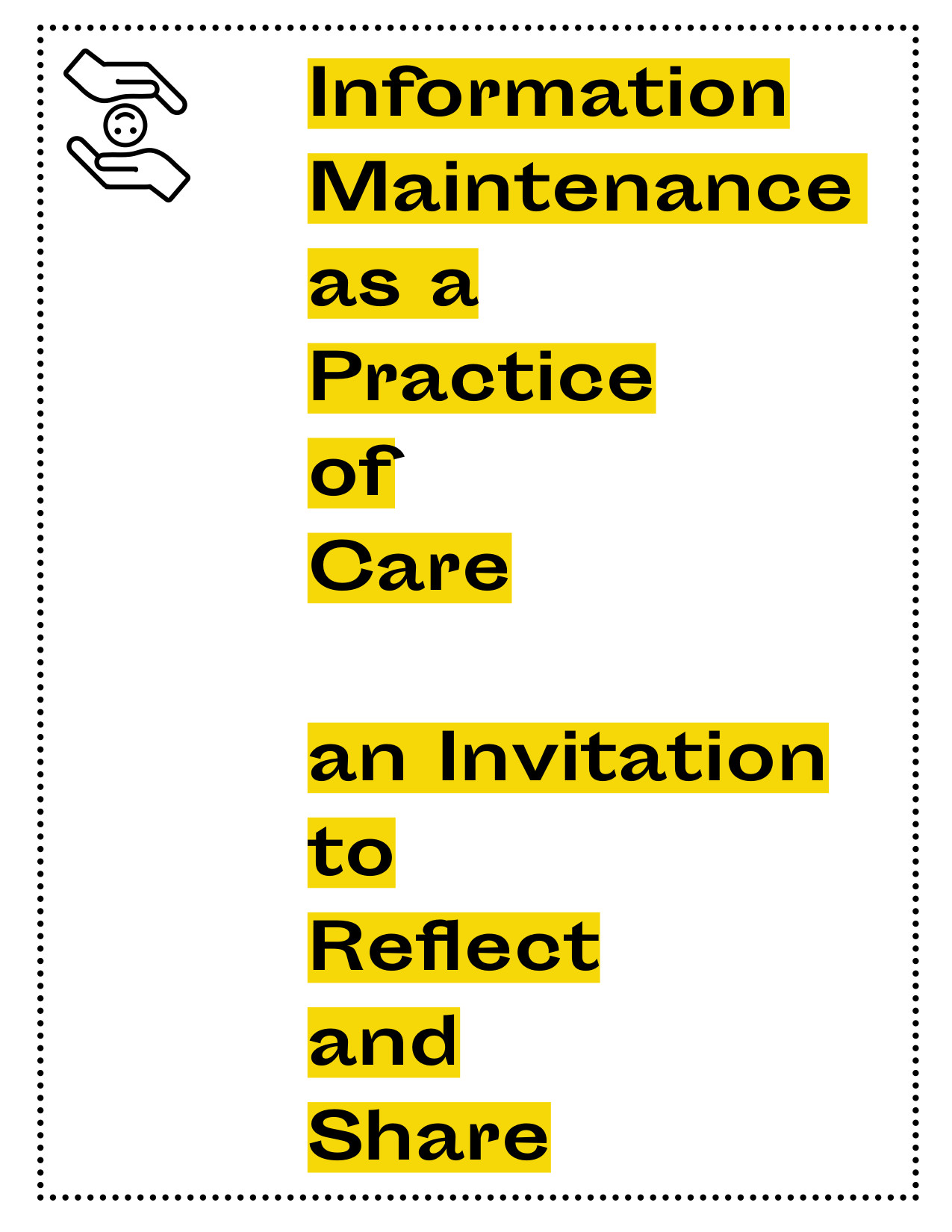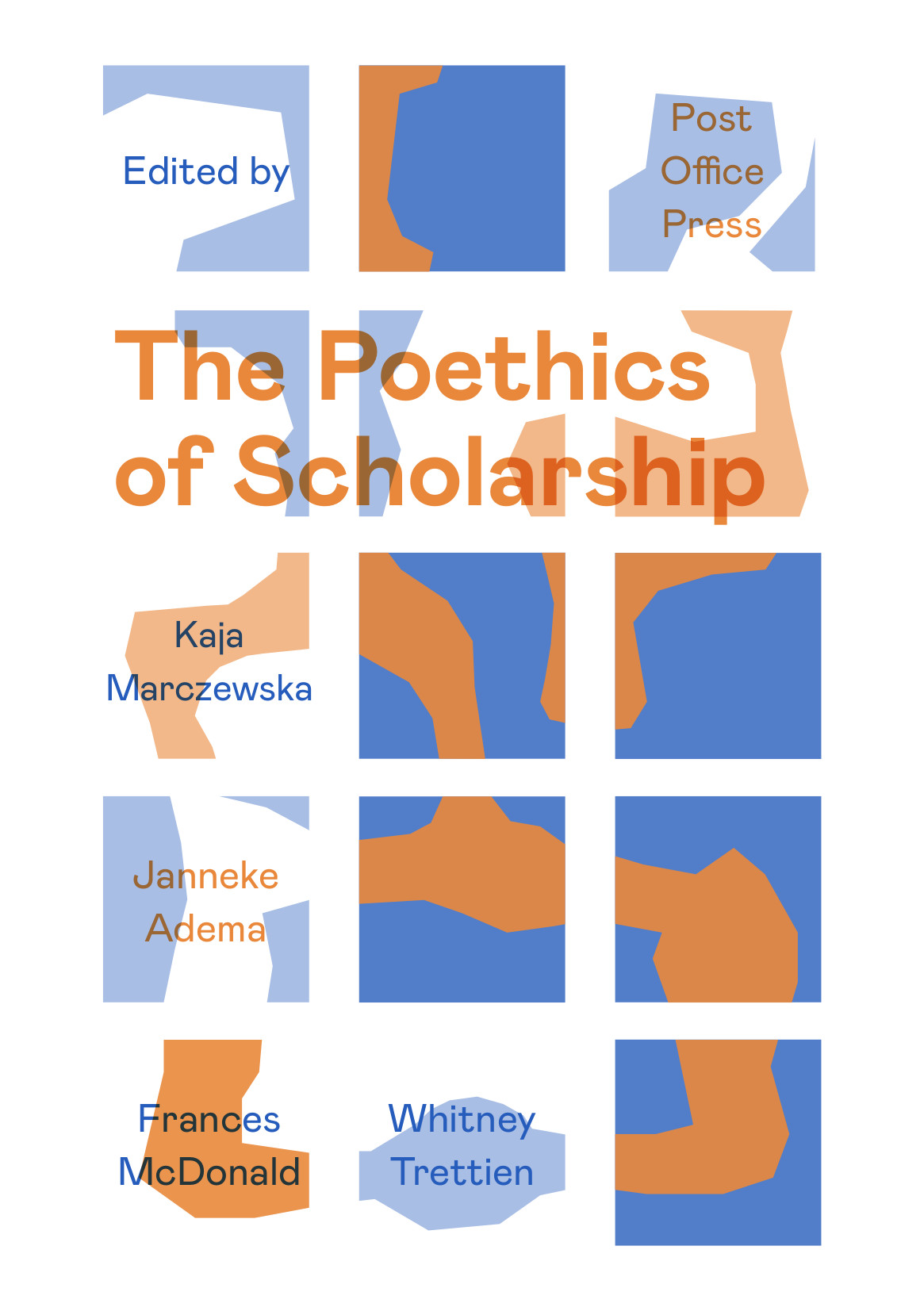Information Maintenance as a Practice of Care (2019)
Filed under white paper | Tags: · care, information, information maintenance, infrastructure, maintenance, media infrastructure, technology

“If information is to be useful over time, something more than preservation is required: it must be carefully maintained. The authors of this paper, all participants in what we call “information maintenance,” came together because of a deep commitment to recasting our work in these terms and infusing it with practices, relationships, and ways of thinking and being that represent a coherent ethic of care.
In this introductory document, we seek to identify both who information maintainers are and who else would be particularly welcome in embracing and supporting information maintenance. We define our key terms of maintenance and care and discuss how they might be practiced, sometimes offering examples to illustrate our points.”
By Amelia Acker, Hillel Arnold, Juliana Castro, Scarlet Galvan, Patricia Hswe, Jessica Meyerson, Bethany Nowviskie, Monique Lassere, Devon Olson, Mark A. Parsons, Andrew Russell, Lee Vinsel, and Dawn J. Wright
Publisher Zenodo, 17 June 2019; corr., 20 June 2019
Creative Commons BY 4.0 International License
29 pages
Post Office Press (ed.): The Poethics of Scholarship (2018)
Filed under book | Tags: · aesthetics, care, ethics, experimental publishing, open access, poetics, publishing, scholarship

“This pamphlet explores ways in which to engage scholars to further elaborate the poethics of their scholarship. Following Joan Retallack, who has written extensively about the responsibility that comes with formulating and performing a poetics, which she has captured in her concept of poethics (with an added h), this pamphlet examines what connects the ‘doing’ of scholarship with the ethical components of research. Here, in order to remain ethical we are not able to determine in advance what being ethical would look like, yet, at the same time, ethical decisions need to be made and are being made as part of our publishing practices: where we publish and with whom, in an open way or not, in what form and shape and in which formats. Should we then consider the poethics of scholarship as a poetics of/as change, or as Retallack calls it, a poetics of the swerve (clinamen), which continuously unsettles our familiar notions?
This pamphlet considers how, along with discussions about the contents of our scholarship, and about the different methodologies, theories and politics that we use to give meaning and structure to our research, we should have similar deliberations about the way we do research. This involves paying more attention to the crafting of our own aesthetics and poetics as scholars, including a focus on the medial forms, the formats, and the graphic spaces in and through which we communicate and perform scholarship (and the discourses that surround these), as well as the structures and institutions that shape and determine our scholarly practices.”
Contributions by Janneke Adema, Kaja Marczewska, Frances McDonald and Whitney Trettien.
Publisher Post Office Press & Rope Press, Coventry, 2018
Creative Commons BY 4.0 License
34 pages
Donna J. Haraway: When Species Meet (2008)
Filed under book | Tags: · activism, animal, bioethics, care, cloning, companion species, dogs, genetics, language, love, philosophy, play, posthumanism

“In 2006, about 69 million U.S. households had pets, giving homes to around 73.9 million dogs, 90.5 million cats, and 16.6 million birds, and spending over $38 billion dollars on companion animals. As never before in history, our pets are truly members of the family. But the notion of “companion species”—knotted from human beings, animals and other organisms, landscapes, and technologies—includes much more than “companion animals.”
In When Species Meet, Donna J. Haraway digs into this larger phenomenon to contemplate the interactions of humans with many kinds of critters, especially with those called domestic. At the heart of the book are her experiences in agility training with her dogs Cayenne and Roland, but Haraway’s vision here also encompasses wolves, chickens, cats, baboons, sheep, microorganisms, and whales wearing video cameras. From designer pets to lab animals to trained therapy dogs, she deftly explores philosophical, cultural, and biological aspects of animal-human encounters.
In this deeply personal yet intellectually groundbreaking work, Haraway develops the idea of companion species, those who meet and break bread together but not without some indigestion. “A great deal is at stake in such meetings,” she writes, “and outcomes are not guaranteed. There is no assured happy or unhappy ending—socially, ecologically, or scientifically. There is only the chance for getting on together with some grace.”
Ultimately, she finds that respect, curiosity, and knowledge spring from animal-human associations and work powerfully against ideas about human exceptionalism.”
Publisher University of Minnesota Press, 2008
ISBN 0816650462, 9780816650460
360 pages
Reviews: Margrit Shildrick (Society and Animals, 2008), Ivan Csicsery-Ronay, Jr. (Humanimalia, 2010).
PDF (updated on 2012-7-31)
Comment (0)
